KLF ends with enriching intellectual discourse
Discussion on economy to environment, security and the silver screen at three-day event
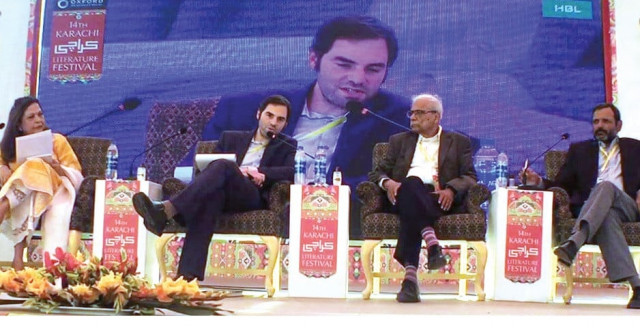
The 14th edition of the Karachi Literature Festival (KLF) concluded on Sunday with the participation of a large number of literature lovers on the third and final day.
The day began with hourlong sessions at 11am, headlined by a discussion on cricket and its role in shaping our identity, and the sway it holds on our nation and politics.
The panellists, including legendary cricketer Wasim Akram, anthropologist and author Ali Khan, culture and sports writer Ahmar Naqvi and Hadeel Obaid, who runs a cricket website.
Nadeem Farooq Paracha moderated the discussion in which Wasim Akram's memoir "Sultan" and Ali Khan's "Cricket in Pakistan: Nation, Identity and Politics" were launched.
A simultaneous panel discussion titled after Shabbar Zaidi's book "Faith and Intellect" took place among the author, economist Kaiser Bangali and Syed Salim Raza and Syed Shabbar Zaidi.
The discussion explored the role of faith and rationality in the State.
In a session titled, "Pakistan's Economy: Depth and Resilience", Miftah Ismail, Akbar Zaidi, Muhammad Aurangzaib and Azfar Ehsan discussed the challenges and opportunities facing Pakistan's economy.
The session also highlighted the potential of the agriculture, industry and services sectors.
Liberal arts education was discussed in a session featuring Anjum Halai, Shoaib Zaidi and Nadya Qamar Chishty-Mujahid.
Tributes were also paid to Urdu author Masood Ashar and Sindhi poet Imdad Hussaini.
Peace and security
Several sessions on the issues of security, economic development and political stability were the highlights of the last day in which the challenges faced by Pakistan and the South Asian region were discussed.
The headline session featured Major General (retired) Athar Abbas, a former director general of the Inter-Services Intelligence.
He was part of a session on security and peace among neighbouring countries featuring veteran journalist Zahid Hussain and foreign relations analyst Michael Kugelman.
Pakistan's ties with India, the role of the US in the region, and the economic imperative were some of the issues discussed.
Another book, on policing in Karachi, was launched at the festival.
Its author Dr Zoha Waseem was interviewed by journalist Mahim Maher.
Omar Shahid Hamid, a police officer and fiction writer, was part of the dialogue.
Culture & arts
A session titled, "Saints, Sufis and Shrines: The Mystical Landscape of Sindh", attracted a lot of attention.
The panellists talked about the history and importance of Sufism and its impact on the culture and society of Sindh.
They discussed the significance of saints and Sufis, their teachings, and their shrines in Sindh.
Another popular session was "From Silver Screen to Mini Screen: Goldmine of OTT Media", in which the panellists included Faseeh Bari Khan and Sanam Saeed.
They highlighted how digital streaming platforms, especially OTT platforms, create possibilities for content creators by providing more creative freedom and access to a wider audience.
They also discussed the new forms of storytelling through these platforms and the vast potential in Pakistan for making the media industry democratic.
Without Anwar Maqsood's humour, KLF is dull.
In a session titled, "Second Meeting", the master humorist and his wife Imrana Maqsood interacted with Ahmed Shah.
The exchange fascinated the audience and was laced with Maqsood's signature wit.
Environment
Environmentalist Ahmed Shabbar, journalists Afia Salam and Zoha Tunio, and Mathieu Paley discussed climate change on how and why people in the developing world pay the price for the misdeeds of those in the developed world.
Several sessions were held in the evening in which renowned international intellectuals including Rasheeda Watts, Kirsha Copes, Booker Prize Winners Shehan Karunatilaka and Damon Galgut, and Sinan Antoon participated.
At the closing ceremony, Noori's spectacular performance in the main garden gripped the audience.
Ali Hamza and Ali Noor's songs mesmerised the audience and will be remembered for ages.
Arshad Saeed Hussain, the managing director of event organizer's the Oxford University Press, said he was delighted with how the festival went.
"The KLF is not just an event but a movement that aims to promote study and learning attitudes," he said.


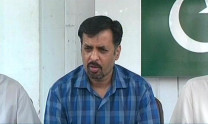
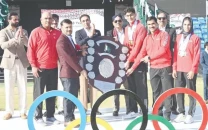
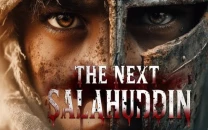
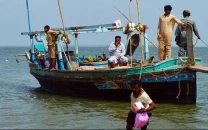













COMMENTS
Comments are moderated and generally will be posted if they are on-topic and not abusive.
For more information, please see our Comments FAQ